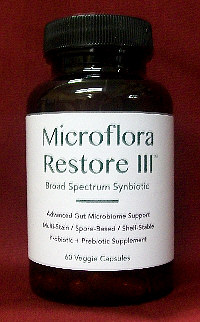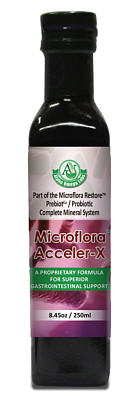|
Broad Spectrum Synbiotic (Prebiotic / Probiotic)


Code 710C - 60 Capsules
Serving Size: 1 Capsule
Servings Per Day: 1 / Per Container: 60
Two Months Supply - $49.00
Product Label
 his is the third and latest version of
Microflora Restore,
which we introduced to the public in 2002. In 2017, we introduced
Microflora Restore II -- a complete
synbiotic and mineral formula, and now we are introducing Microflora Restore III,
a more targeted probiotic product.
 Microflora Restore III Microflora Restore III is a unique
product with the following characteristics:
- Superior growth medium -- Non-GMO, vegan, hypoallergenic.
- Verified strains -- Third-party DNA verified to ensure identity.
- Vital probiotic varieties
- Bacillus megaterium -- a variety that produces
antioxidant carotenoids in the GI tract that are highly bioavailable.
A B12 producer. Aspergillus antagonist.
- Bacillus pumilus -- is a natural producer
of vitamin B2 which also produces its own antioxidant carotenoids.
- Bacillus subtilis -- an extraordinarily hardy strain that balances
the gut microbiome. This strain is so robust and resistant to environmental stresses
that it has been used to study the behavior of microorganisms in outer space. 1
- Bacillus clausii -- A European strain with unique healing properties.
B. clausii has been shown to prevent recurrent respiratory infections in children. 2
- Bacillus coagulans -- Closely associated with its ability to
treat diarrhea, B. coagulans is also effective in digestive problems, irritable bowel
syndrome (IBS), inflammatory bowel disease (IBD), and the treatment of H. pylori,
among other conditions. 3
- Resists environment stress factors: These spore-based strains are
innately resistant to light, heat, stomach acid, and time -- thus giving them
longer shelf-life. They have a high level of internal resiliency.
- Allergen Free: Artificial fillers, corn, dairy, egg,
gluten, GMO's, nuts and soy.
- Prebiotic Support: This formula has prebiotic support, maintaining
its "stand-alone" functions. It is also compatible with Microflora Accelera X
(see below). These prebiotics contain natural-occurring food-based polyphenols and polysaccharides
and include the following:
- Bladderwrack extract (Fucus vesiculosus, wild-harvested, certified organic)
- Humic Acid
- Larch arabinogalactan (Larix spp.)
- Nordic chaga (Inonotus obliquus, wild-harvested, certified organic)
- Red reishi extract (Ganoderma lucidum, fruiting body, certified organic)
- Wakeme extract (Undaria pinnatifida, sporophyll, certified organic)


Code 711C - 8.45 fl. oz. (250 ml.)
48 Servings (48 Day Supply) - $26.50
Take one tsp. (5 ml.) daily, mixed in
a small glass of water or juice
Product Label
 icroflora Acceler-X icroflora Acceler-X is a stand-alone,
"full-spectrum" prebiotic -- (see "Primer" article below). We created this product for those who simply
want an "easy-to-take" prebiotic to support the body's
existing intestinal microflora.
 [ Active Ingredients: Purified Water, acacia gum
(gum arabic) 4,
agave inulin 5,
galacto-oligosaccharides 6,
guar gum 7. Minor ingredients and
excipients: zinc sulfate, magnesium sulfate, ferrous sulfate, potassium sorbate,
citric acid, and boric acid. ]
A Quick Primer On Prebiotics
 Stated in its simplest terms, prebiotics are fermentable
plant fibers that feed the good bacteria that is already in the lower gastrointestinal
tract. 8 By doing this, prebiotics improve the good-to-bad ratio of bacteria in the gut.
Plant fibers, as you find in Microflora Acceler-X, pass through the small intestines
undigested, and, depending on the type, nourish bacteria at various locations throughout
the colon, which itself has anywhere between 400-500 different species of bacteria
and more than 7,000 strains. 9 Among the many benefits conferred
by a full-spectrum prebiotic, like Microflora Acceler-X, are:
- Better mental health
- Better immune function
- Improved vitamin and mineral production and absorption
- Improved regularity
- Improved bone density
- More energy / less fatigue
- Less inflammation
- Less appetite, making it easier to lose weight
- Positive effects against gastritis and leaky gut
- Among many others . . .
 We call "Acceler-X" a "full-spectrum" prebiotic,
because it nourishes bacteria that thrive in the early stages of the colon
(i.e. galacto-oligosaccharides: cecum to transverse colon), later stages of the colon
(i.e. inulin: traverse to sigmoid), and intermediate stages (acacia and guar gums).
 Prebiotic Foods: Prebiotic Foods: Although a well-designed prebiotic can have
dramatic effects on improving intestinal flora, it also helps to include more "prebiotic" foods in the
diet. About 5 grams of plant-based "prebiotic fiber" per day is recommended. These are listed below with
the approximate percentage of prebiotic-containing fiber:
- Raw chicory root (>64%)
- Raw Jerusalem artichoke (>31%)
- Raw dandelion greens (>24%)
- Raw garlic (>17%)
- Raw leeks (>11%)
- Raw onion (>8%)
- Cooked onion (>5%)
- Raw asparagus (5%)
- Raw wheat bran (5%)
- Raw banana (1%)
Footnotes
- See:
Global Healing Center article on B. subtilis.
- See: NIH review of B. clausii.
- See: Web MD review of B. coagulans.
-
Gum arabic establishes prebiotic functionality in healthy human volunteers
in a dose-dependent manner. (2008) It should be noted that this study determined an optimal dosage of 10 g/d,
it did not determine the synergistic effects when combined with other prebiotics. See also:
Acacia Gum is a Bifidogenic Dietary Fibre with High Digestive Tolerance in Healthy Humans (2009); among others.
-
Agave Inulin Supplementation Affects the Fecal Microbiota of Healthy Adults Participating in a Randomized,
Double-Blind, Placebo-Controlled, Crossover Trial (2015);
Inulin-type fructans of longer degree of polymerization exert more pronounced in vitro prebiotic effects (2006);
Production of Fructooligosaccharides from Inulin by Endoinulinases and
Their Prebiotic Potential (2010); among others.
-
Supplementation of Diet with Galacto-oligosaccharides Increases Bifidobacteria,
but not Insulin Sensitivity, in Obese Prediabetic Individuals (2017);
Prebiotic inulin-type fructans and galacto-oligosaccharides: definition, specificity,
function, and application in gastrointestinal disorders (2017); among many others.
-
In vitro analysis of partially hydrolyzed guar gum fermentation on identified gut microbiota (2016);
Prebiotic Effects and Fermentation Kinetics of Wheat Dextrin and Partially Hydrolyzed Guar Gum in
an In Vitro Batch Fermentation System (2015);
Consumption of partially hydrolysed guar gum stimulates Bifidobacteria and butyrate-producing
bacteria in the human large intestine (2015); among others.
-
Relationship of prebiotics and food to intestinal microflora, European Journal of Nutrition, October 2002,
Volume 41, p. i11-i16.
- Charalampopoulos, Dimitris; Rastall, Robert A. (ed.);
Prebiotics and Probiotics Science and Technology, Springer Reference, New York, 2009.
ISBN: 978-0-387-79059-6. p. 10.
|
User Instructions
 Take one to two
capsules, with or without food, or as recommended
by your healthcare practitioner. Contains: No corn,
dairy, gluten, GMO's, soy, tree nuts, wheat, or yeast.
No artificial excipients, binders, fillers, flow agents,
or stearates used.
Probiotic Review
& Studies
 The links below provide a starting point for
an exploration of current probiotic research and relevant nutraceutical
self-education. They represent a tiny fraction of research in this area
that is recently published or currently in progress.
General
-
Bacillus species are superior probiotic feed-additives for poultry (2016) --
Despite the focus here on poultry, vital inferences can be made since the antibiotics
sited have the same effect on humans. Glyphosate-based herbicides (like Roundup ®)
are exerting powerful antibiotic effects on people, in residuals that will persist
years after consumption. One soil scientist expert I conferred with said that the
problem is so severe, he sees a situation evolving where probiotics MUST be
consumed simply to live a normal human life. (Thank you, Monsanto.)
Bacillus megaterium
Bacillus pumilus
Bacillus subtilis
-
12 Proven & Potential Benefits of the Probiotic B. subtilis (2016) --
Good review article with links to reputable studies to support stated claims.
-
Novel insight on probiotic Bacillus subtilis: Mechanism of action and clinical applications (Journal of Current Research
in Scientific Medicine, review article, 2016) --
"In recent times, there has been significant progress in scientific evaluation and studies on probiotic Bacillus subtilis,
revealing possible mechanisms of action like antimicrobial effect by synthesis of antimicrobial substances, antidiarrheal effect,
immunostimulatory effect, competitive exclusion of pathogens, prevention of intestinal inflammation, and normalization of intestinal
flora. Numerous preclinical and clinical studies on B. subtilis have shown its promising efficacy in the treatment and prevention of
diarrhea of various etiologies. B. subtilis is certified as generally recognized as safe by Food and Drug Administration and features
in the European Food Safety Authority Qualified Presumption of Safety, hence suggesting as safe for human use. All of these beneficial
attributes make B. subtilis the most attractive probiotic species for various clinical conditions."
Bacillus clausii
- Bacillus clausii - The Probiotic of Choice in the Treatment of Diarrhoea -- (Review article with downloadable PDF, 2015).
"In this paper, evidence for the efficacy of Bacillus clausii, a spore forming probiotic (viz clinical studies)
in the treatment of diarrhoea, prevention of antibiotic associated diarrhoea and in the prevention of side effects
associated with Helicobacter pylori is presented. Mechanism of action suggested is through inhibition of pathogens and
immunomodulatory effects. Bacillus clausii is the probiotic of choice in the treatment of diarrhoea as it has the
added advantage of being a spore forming probiotic. It is therefore stable at room temperature and resistant to low pH
ensuring that it reaches the small intestines where it can colonize and exert its beneficial effects."
Bacillus coagulans
|